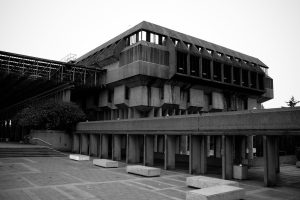Poetry Speaks to the Arab-American Experience
Dec 12, 2019
If laughter is medicine, Marwa Helal’s poems are some strong antibiotics.
John Carroll’s English and Peace, Justice, and Human Rights Departments co-hosted the Egyptian-born, American-raised poet Marwa Helal on Monday, Nov. 11, in Rodman Hall.
She shared a number of her works from her recently published book, “Invasive species,” which draws on her experiences growing up, her thoughts on immigration and the current events that have shaped our country.
These poems are strikingly honest and darkly humorous in a way that articulates what it means to live in the United States today.
Things aren’t always good. In fact, if you watch the news, things seem pretty bad.
But even though CNN has 20 boxes on its screen, all filled with one talking head or another claiming that our world is on fire, there is still room for students in Northeast Ohio to sit and listen to a poet pitch us some hot new reality TV series, in a poem called “reality show”:
prisoner swap
al azhar’s next top fatwa
the great baklawa baking show
fear factory
meet your dystopian date
weapons deal or no weapons deal
name that war
sanction this
amazing race for clean water
so you think you can poetry?
survivor: post-deportation edition
Helal weaves her unique memories of growing up with the commonplace American narratives of a childhood in Ohio. In her poem “Census,” Helal describes an exchange her father had with an employee of the Census Bureau who came knocking on their door, questioning how Mr. Helal filled out the form. He addresses the census employee, saying:
“Hang on, please. Just one second.” He loudly called out, “yaa Aaazza, Maarrrwaa, Haaatem, Yaassserrr…”
The repetition of r’s is linguistically specific to the Arabic language. I could hear my own father’s voice in the poem.
If the three r’s in her name aren’t indicative of an Ohio suburban dad, then I don’t know what is. I laughed at the universality of a father’s voice echoing throughout his home while he was trying to locate his children.
Another poem that struck me was “From-from,” which describes a conversation immigrants often have that goes like this:
“Where are you from?”
“Cleveland.”
“No, like, where are you from from?”
Helal articulates a sentiment shared by so many people who, regardless of their citizenship or which country they have spent most of their lives in, do not feel accepted as Americans.
Helal believes that artists of all media owe it to ourselves and others with shared experiences to articulate the traumatic and ugly parts of our lives so that other people know that they are not alone.
Her poems access a wide range of emotions that are both extremely personal and collective.
In this sense, her poems take on their own humanity that mirrors the complexity of our own.











